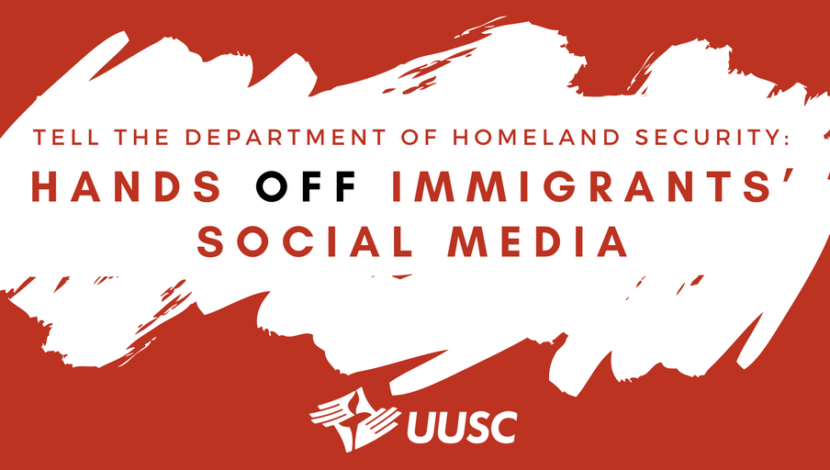The Unitarian Universalist Service Committee advances human rights through grassroots collaborations.
DHS: Hands Off Immigrants’ Social Media!

By on October 18, 2017
The Department of Homeland Security (DHS) is taking new steps to monitor and criminalize immigrant communities: they’re pro-actively gathering and recording social media information of all immigrants to the United States – including new immigrants, permanent residents, and naturalized citizens.
This data could be used to prosecute, deny benefits to, limit due process of, and even deport people. It may also affect those who communicate with immigrants on social media by including their conversations in government surveillance.
UUSC sent the comment below in response, urging DHS to rescind this rule.
October 17, 2017
Mr. Jonathan R. Cantor
Acting Chief Privacy Officer
Privacy Office
Department of Homeland Security
Washington, DC 20528-0655Re: DHS-2017-0038 – Notice of Modified Privacy Act System of Records
Dear Mr. Cantor:
The Unitarian Universalist Service Committee submits this comment for the public record to express our opposition to the Department of Homeland Security’s recent modification to the Privacy Act System of Records, published as docket number DHS-2017-0038 (the “proposed rule”). In particular, we are concerned by the new provisions on p. 43557, paragraph 1, column 1, to “expand the categories of records to include […] social media handles, aliases, associated identifiable information, and search results[.]”
We respectfully request that the agency withdraw this proposed rule. As a human rights agency with over 40,000 members and supporters across the United States, we believe this proposed rule threatens the rights and principles we and our partners work to uphold. Our chief concerns are as follows:
This proposed rule is discriminatory.
The proposed rule unfairly burdens naturalized citizens with a degree of surveillance that does not apply to birthright citizens. It thereby sets up a two-tiered system of citizenship, in violation of the principle of the equal protection of the laws.
The proposed rule would expose immigrants and others with Alien files to higher levels of surveillance and government scrutiny than other U.S. residents. This is a form of , i.e. subjecting some members of the community to an unjust presumption of suspicion.
This proposed rule chills free speech.
Information posted on social media may be misrepresented as “gang-related” and place an immigrant at heightened risk of deportation. Immigration and Customs Enforcement (ICE) frequently prioritizes deportation of immigrants based on alleged gang ties, and immigration agents have, according to several recent lawsuits, repeatedly misinterpreted hand gestures, tattoos, and colored clothing as symbols of gang membership.
Gang membership accusations are made and acted upon without due process or lawful conviction and on the basis of unreliable “gang databases.”[2] They are therefore particularly vulnerable to being informed by racial and ethnic bias.
This proposed rule threatens privacy.
While this new rule directly affects only publicly available information on social media, CBP and ICE agents have in the past asked immigrants to divulge social media passwords. We are concerned that the collection of information on social media accounts under this new rule, as well as the linking of online aliases to real people, could easily create more targets for future government efforts to obtain social media log-in credentials and other private information.
Government surveillance and data collection on such a scale may intrinsically be rife with potential for abuse, including stalking, data breaches, and other major invasions of privacy.[3]
This proposed rule will not make anyone safer.
The use of information on social media has not proven to be a valuable tool in screening for immigration benefits. DHS’s Office of the Inspector General found in a February 27, 2017 report that DHS pilot programs to collect social media information “lack criteria for measuring performance to ensure they meet their objectives.”[4]
Theories of “radicalization” that treat opinions and statements made on social media as reliable indicators of future violent or terrorist behavior have been debunked.[5] Violent acts are not reliably linked to specific ideologies, belief statements, or personality profiles, and vice versa.
This proposed rule threatens due process.
This new rule arrives at a time when Congress is considering options that would further undermine due process for lawful permanent residents, asylum seekers, and other immigrants. (See the “Criminal Alien Gang Member Removal Act” (H.R. 3697), e.g.)[6] Now is a particularly dangerous time to open more immigrants’ photos and personal information to potential misinterpretation as gang-related.
In these ways and others, we remain concerned that this proposed policy will encourage the use of unjust stereotypes about criminality and terrorism as a basis for government actions.
We strongly urge you to heed these concerns and rescind the new rule.
Respectfully,
Joshua Leach
Associate for Programs, Research and Advocacy
Unitarian Universalist Service Committee
jleach@uusc.org[1] National Public Radio, “Undocumented Teens Say They’re Falsely Accused Of Being In A Gang,” August 17, 2017. http://n.pr/2zlDdp9; Vice News, “How ICE Uses Secret Police Databases to Arrest Immigrants,” August 28, 2017. http://bit.ly/2wMa4FT
[2] Ali Winston, The Intercept, “Vague Rules Let ICE Deport Undocumented Immigrants as Gang Members,” February 17, 2017. http://bit.ly/2lt0jGw
[3] Upturn, “Civil Rights, Big Data, and Our Algorithmic Future,” 2014. https://bigdata.fairness.io/database-abuse/
[4] DHS OIG, “DHS’s Pilots for Social Media Screening Need Increased Rigor to Ensure Scalability and Long-term Success,” February 27, 2017. http://bit.ly/2yJ94TK
[5] Faiza Patel, Meghan Koushik, Brennan Center, “Countering Violent Extremism,” March 16, 2017. https://www.brennancenter.org/publication/countering-violent-extremism
Immigrants have the same rights to free speech and privacy as everyone. No one should feel they are the targets of profiling, monitoring, and unreasonable suspicion by the state. We must raise our collective voices against this far-reaching rule. Tell the government: Respect the privacy and safety of immigrants by keeping out of their social media.

